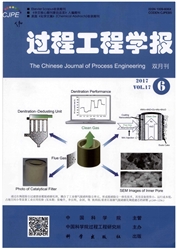

 中文摘要:
中文摘要:
综述了工业废水电渗析体系膜污染类型、性质、影响因素等的研究进展.无机污染主要是Ca2+,Mg2+或其他高价离子在离子膜表面或内部形成的结垢现象,原理是极化或溶液过饱和形成沉淀.有机污染是由蛋白、腐植酸、表面活性剂及大分子有机物在离子膜表面沉积或渗透到膜内部而形成,原因主要是带负电荷的有机物与阴膜荷正电基团的静电作用及带苯环有机物与基膜的亲和作用,其次是有机物分子大小与膜的网络结构的作用.膜污染形成及其性质与施加电流、共存组分、温度、pH值和运行时间等密切相关,可造成离子膜导电性、离子交换容量、水含量和极限电流密度等减小,且有机污染对电渗析性能的影响比无机污染更严重.由有机物凝胶层形成的膜污染可用电渗析膜污染指数定量描述.
 英文摘要:
英文摘要:
The lasted research progresses related to types, properties, and influential factors of membrane fouling occurring in industrial wastewater desalination by electrodialysis are summarized. Inorganic fouling mainly results from the scaling of Ca2+, Mg2+ or other multivalent ions on the surface or inside of ion exchange membrane, in which the polarization or solution supersaturated precipitation leads to the membrane fouling. Organic fouling results from the deposition of proteins, humate, surfactant or other macromolecular organic matters on the surface or in inside of membrane. The main cause of anion membrane fouling by organic matters is related to the electrostatic interaction between negatively charged organic matters and anion exchange membrane with positively charged groups and the affinity interactions between the membrane matrix and aromatic compounds, and the membrane fouling is also related to the molecular size and network structure of organic compounds. The formation mechanisms and properties of membrane fouling are closely related to the applied electric current, coexisting components, temperature, p H value and running time, etc. The membrane fouling can result in the decrease of conductivity, ion exchange capacity, water content and limiting current density. Moreover, the effect of organic fouling on the electrodialysis performance is more obvious than that of inorganic fouling. The membrane fouling caused by the formation of organic compound gel layer can be quantitatively expressed by membrane fouling index for electrodialysis.
 同期刊论文项目
同期刊论文项目
 同项目期刊论文
同项目期刊论文
 期刊信息
期刊信息
